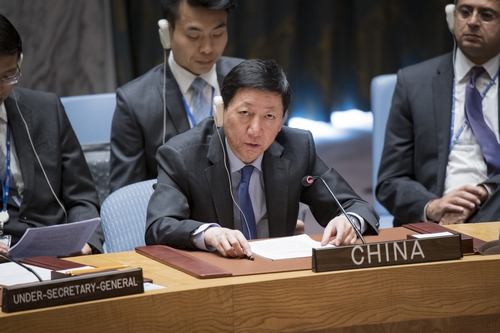| Statement by Ambassador WU Haitao at the Security Council Briefing on Threats to International Peace and Security Caused by Terrorist Acts |
| 2017-06-08 22:02 |
|
China thanks Under-Secretary-General Jeffrey Feltman for his briefing. China welcomes the Secretary-General’s report (S/2017/467) on the threat of the Isalmic State in Iraq and the Levant (ISIL) to international peace and security. Recently, Egypt, Afghanistan, the United Kingdom, France and Iran suffered terrorist attacks. The attacks caused enormous civilian casualties and significant property losses. Terrorism is a common enemy of humankind and its impact goes beyond borders. No country can respond to terrorism single-handedly or insulate itself from the scourge. The international community should embrace the concept of a community bound by a common destiny, identify new trends and patterns in the evolution of terrorism, enhance cooperation and work collectively to respond to the threat. First, we must garner international consensus on the fight against terrorism. Terrorism represents a threat to humankind. The international community should uphold unified standards, adopt a zero-tolerance approach without any distinction. Regardless of a terrorist’s location, their pretexts, which country they are targeting or which tactics they use, terrorism must be fought with resolve. International counter-terrorism efforts must respect the sovereignty of the countries concerned, which bear the primary responsibility of fighting terrorism. Those efforts must also defer to the leading role of the United Nations and the Security Council and abide by the purposes and principles of the Charter of the United Nations. Terrorism should not be associated with any nationality or religion. Secondly, we must eliminate breeding grounds of terrorism. At present the major terrorist elements and forces are entrenched in conflict zones, including Iraq and Syria, benefiting from regional turmoil, launching terrorist attacks in regions beyond conflict zones and threatening regional and international peace and security. The international community should address regional hotspots with a heightened sense of urgency, encourage the relevant parties to resolve regional conflicts through political processes and dialogue, maintain regional peace, stability and development, and eradicate the causes of terrorism at an early date. Thirdly, we must disrupt the terrorist transit network. With continuous progress being made in international counter-terrorism efforts, terrorist fighters are traveling to or returning to other countries in the relevant regions and beyond, seriously threatening the security of countries of destination, transit and origin. The countries concerned must enhance cooperation in the fields of border control and law enforcement, share information and intelligence, disrupt terrorist transit networks and respond collectively to the threat posed by returning terrorists. Fourthly, we must cut off the financing channels for terrorist activities. These are increasingly diversified and include the plundering of natural resources; narcotics and human trafficking; and the smuggling of cultural relics, with the funds raised being used for terrorist activities. The international community must take countermeasures and implement the relevant Security Council resolutions, including resolutions 2199 (2015) and 2253 (2015); enhance financial regulations and enforcement cooperation; and crack down on all forms of financing by terrorist organizations. Fifthly, it is important to suppress the use of the Internet by terrorist organizations. Terrorist organizations are using the Internet and social media as a platform to spread their violent and extremist ideologies and to disseminate terrorist propaganda as well as engage in financing, recruitment and the incitement and planning of terrorist activities. All States must fully implement the relevant Security Council resolutions and enhance cyber legislation, enforcement and regulation. The United Nations should play a coordinating role in the international community’s efforts to carry out pragmatic cooperation and collectively crack down on the use of the Internet for terrorist purposes. China is an important member of the international force against terrorism. In recent years China has participated in meaningful ways in multilateral counterterrorism mechanisms, including the United Nations, the Shanghai Cooperation Organization and the Global Counterterrorism Forum. China will continue to participate and to promote multilateral and bilateral counter-terrorism cooperation, enhance the sharing of counter-terrorism intelligence, and provide counterterrorism supplies and capacity-building to developing countries to the extent of our ability. China stands ready to work with all countries to respond collectively to the threat of terrorism and violent extremism and to maintain international peace and stability. (UN Photo/Emanuel Elias) |
| |||||||||||||
| |||||||||||||
